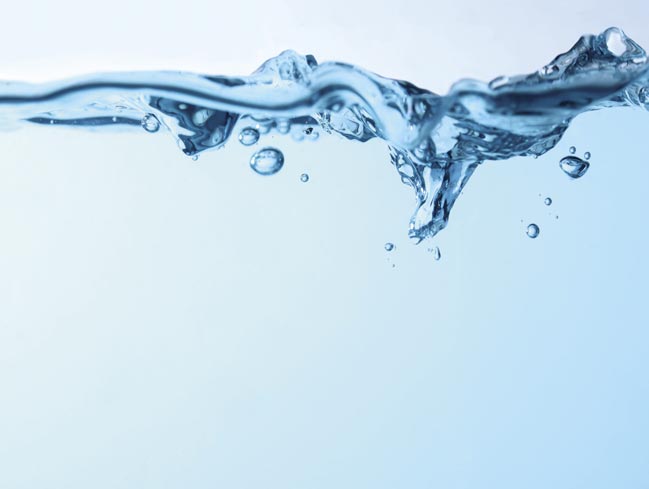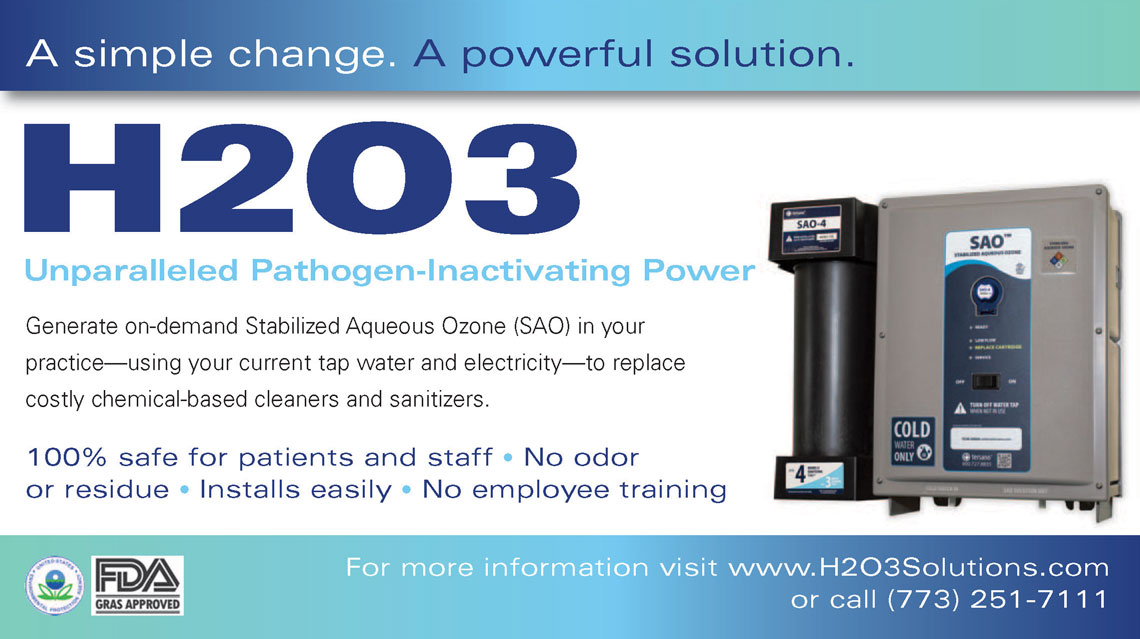Why you need it. How it works.
Three little atoms, two hydrogen and one oxygen, not only support all life on Earth (and who knows where else), they have defined the course of human history. We not only need H2O to survive, we’re mostly made of it. It is the largest component in our bodies, the percentage depending on age, gender, percent body fat and other factors. Muscle has higher water content than body fat so, as women naturally have more body fat than men, they are made up of slightly less water. Generally speaking, though, the human body is about 60-70% water. Which is why proper hydration enables every system in the body to perform at optimal levels.
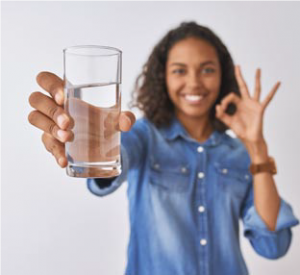
www.istockphoto.com
Isn’t it amazing, in retrospect, that it took until just about a generation ago for corporate America to tap into the money-making potential of water? Now there are more than 80 bottled brands of the clear stuff in the U.S. alone. Water is vital to our health and we’re willing to pay for it—ironically, to the point that the plastic it comes in is now becoming a major health threat. We are so overexposed to the commercial hype of water that sometimes it’s easy to lose sight of why and how it helps, how much is enough, and when enough teeters on the edge of too much.
According to the USDA, your absolute minimum water requirement varies depending on the amount of water lost through perspiration, respiration, urination and metabolism. For instance, those who engage in prolonged exercise or live in hot, humid climates will have a higher water intake requirement than those who do not. Most scientists and health professionals agree that the average human needs anywhere from 1 to 4 liters of water intake per day to prevent dehydration. A diet that includes fruits and vegetables supplies about 20% of the needed fluids, while water and other beverages take care of the rest. For many years, the “8 x 8” rule has been something of a standard: eight eight-ounce glasses a day. Those eight glasses can include any beverage—such as morning coffee and sugary soda—but water is the best choice.
Interestingly, the “8 x 8” rule doesn’t have a ton of science behind it; it’s just easy to remember. You’d think it was a marketing ploy to get you to buy more Poland Springs. The truth is that “8 x 8” may actually undersell water’s benefits. NASEM (the U.S. National Academies of Science, Engineering and Medicine), which has been issuing scientific reports for more than a century, says the average woman should consume 11 ½ cups of fluid a day (75 ounces, when you factor in food) and the average man should drink 15 ½ cups (98 ounces, factoring in food).
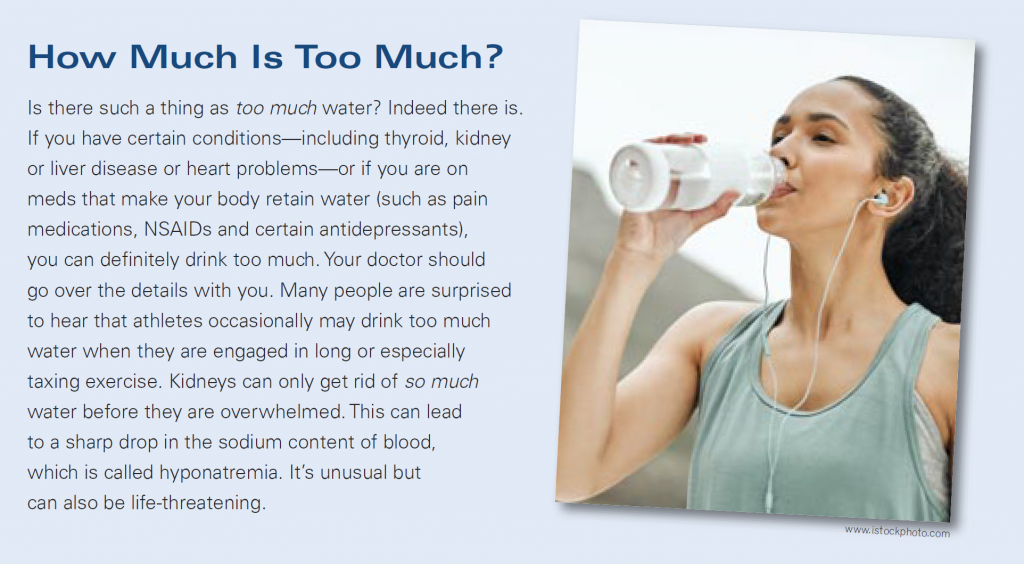
As mentioned, the water you’re replacing leaves your body through sweating, breathing and bathroom visits. Strenuous yard work, a set of tennis or an afternoon of pick-up basketball on a summer day can sweat away as much as 10% of your body’s water. That may not sound like a lot until you consider that most studies show that, at just 2%, dehydration can ensue and performance starts to decline. Fatigue sets in, brain function starts to diminish, headaches are more likely and even mild dehydration can impair your mood. Most everyone knows that continuous hydration during this type of activity is important, but far fewer are aware that downing a pint of water before you begin exercise can be a big difference-maker.
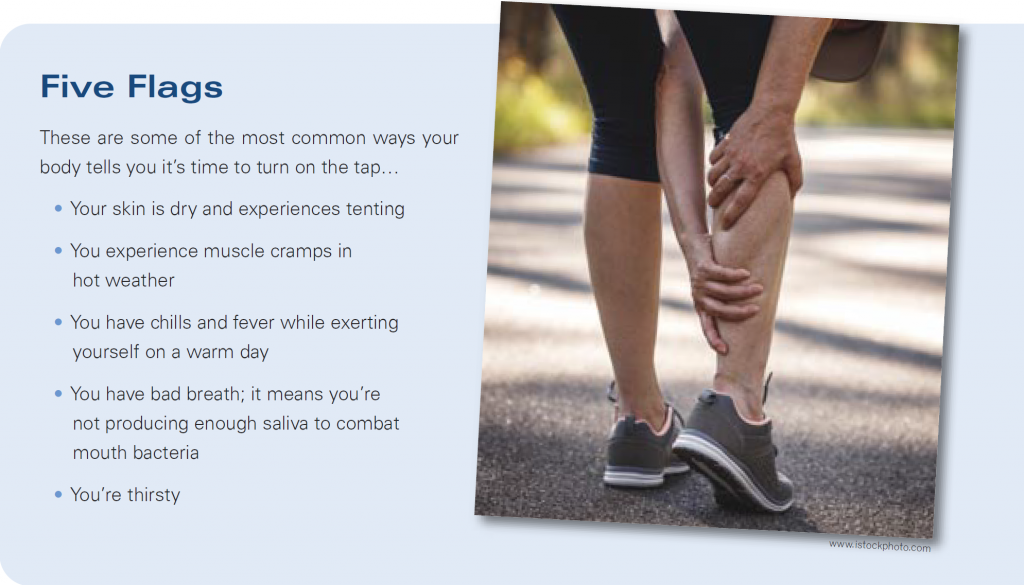
H2O’s CV
Let’s take a look at water’s “résumé,” because it’s pretty impressive. Among the many benefits and qualities of water are that it…
- Helps maximize physical performance
- Significantly affects energy levels and brain function
- Can aid in weight loss by suppressing appetite and increasing calorie burning
- Boosts skin health and beauty
- Maintains electrolyte balance
- Carries nutrients to your cells
- Flushes bacteria out of your bladder
- Regulates body temperature (especially this time of year)
- Helps to regulate blood pressure
- Cushions joints by providing lubrication
- Decreases constipation (particularly water rich in sodium and magnesium)
- Dilutes concentration of minerals that can contribute to kidney stones

www.istockphoto.com
Water is also extremely helpful in mitigating hangover symptoms, especially when consumed intermittently while partaking of alcohol. Most people know that “having a few” leads to excess urination and dehydration, but don’t know why. The answer is that alcohol dulls the connection between your brain and your kidneys, so your kidneys don’t know how much water to keep in storage. The instructions your brain issues to your kidneys is done partially through the posterior pituitary gland, which tells your body how much fluid to excrete through urination (and also how much to hold on to).
Finally, anyone who’s been on any kind of a weight-loss diet recognizes the importance water plays. Water consumption increases your metabolic rate slightly and, as mentioned, makes you feel “full” if you drink a pint or so a half-hour prior to each meal.
In most cases, your body will tell you when it’s time to rehydrate. It’s called being thirsty and, thanks to millions of years of evolution, it works more or less the same for humans as almost every other mammal. If your fluid reserves get too low, your brain triggers the thirst mechanism, so you know it’s time to drink. One reason the elderly become dehydrated is because this brain-kidney communication can become less sharp with age.
“Thousands have lived without love,” the 20th century poet W.H Auden famously wrote, but “none without water.” Famous because one can tease out multiple meanings—about human relationships, about the environment and, on the purest biological level, about the basic functioning of the human body. A person in excellent health can survive without food for a month of more. Deny that same individual access to water and prospects for survival become grim within hours. It all comes down to those three critical atoms joining forces in just the right way.
 Editor’s Note: Dr. Muniba Naqi is an internal medicine specialist and Medical Director of Hospitalist Medicine at Trinitas. Dr. Naqi has been the founding Medical Director for the Trinitas Hospitalist Department for the past seven years.
Editor’s Note: Dr. Muniba Naqi is an internal medicine specialist and Medical Director of Hospitalist Medicine at Trinitas. Dr. Naqi has been the founding Medical Director for the Trinitas Hospitalist Department for the past seven years.

